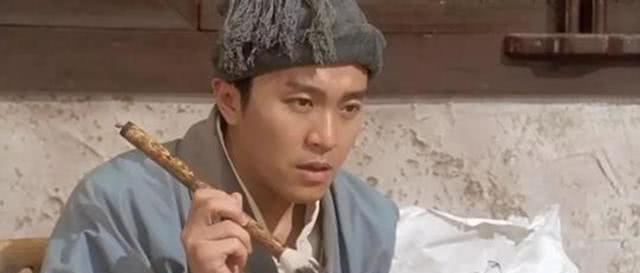A few years ago, a TV series called "Iron Tooth Copper Tooth Ji Xiaolan" was popular all over the country, Ji Xiaolan's talent and quickness, humor and humor also penetrated deep into the body and mind, and its couplet plot with He yandou wisdom and courage also became a paragraph and a terrier, circulating on the Internet.
Ji Xiaolan's name was Ji Yun, a scholar from a scholarly background, an official to the Ministry of Rites Shangshu, an assistant university scholar, and could be said to be the imperial literati of the Qianlong Emperor. He was proud of his talents, and had won the first place in the Shuntianfu Township Examination, Xie Yuan, and as a result, because he was too proud to fall on the list in the examination, and Tang Bohu was the same, he was oblivious, so it was better to be low-key and modest.

In fact, the historical Ji Xiaolan is not incompatible with the water and fire like Hezhen, and he does not have so much ability to make Hezhen suffer losses repeatedly, but his humor is true.
Ji Xiaolan's humor has been recorded by many predecessors, and Niu Yingzhi said of him: "Ji Wenda Gongyun, happy and witty, was insulted by many courtiers." Ji Wenda is Ji Xiaolan, because Jiaqing gave him the nickname "Wenda", he likes to joke, and colleagues are often used by him to make a shabu.
The "Garden Talk" also said that he was "good at humor, known to everyone", and his humor, everyone knows, does not care.
The "Records of the Sinologists of the State Dynasty" is relatively highly evaluated, saying:
Ji Yun's heart is frank and funny, but he suddenly hears his words, almost witty, and thinks about it, which is also a famous saying.
This means that Ji Xiaolan's personality is very funny, and he is also very frank and sincere, and his words always sound very funny, but after carefully recalling it, he found that it was very reasonable. This kind of comedic effect, like Stephen Chow's films, is funny and thought-provoking, and perhaps this is the boundary between vulgarity and humor.
Once, when Ji Xiaolan heard many cases of quack doctors mistakenly treating people, he not only felt emotional, but everyone else was indignant, and Ji Xiaolan formed a couplet with a poignant ancient famous sentence of Li Shangyin and a poem by Du Fu, which not only satirized the quack doctor to a great extent, but also had a very humorous feeling, reading it made people want to laugh, and looked at this link:
The new ghost is annoyed with the old ghost crying, and he is not sure of this life
This shanglian is excerpted from the last sentence of Du Fu's "Soldier Carriage Line", "The new ghosts are annoyed with the old ghosts crying, and the rain and wet chirping in the sky", which describes the scourge of the soldiers brought about by the anshi chaos, when the lives of people at that time were like grass mustard, batches of good boys died on the battlefield, the new ghosts were annoyed, the old ghosts cried, many white-haired people sent black-haired people, and many husbands and wives were isolated from yin and yang, which was really sad.
It makes sense that the battlefield is described in this way, but it feels a little funny to read to describe quack medicine, because it is too exaggerated. First of all, the number of people treated by doctors is limited, the number of mistreated people is also limited, and the proportion of mistreatment to death is even smaller, but it is described by Ji Xiaolan as one after another by quacks.
The lower link is excerpted from Li Shangyin's "Ma Song Qi's Second" "Overseas disciples are more Kyushu, he was born uncertain of this life", this is an epic poem, the theme is the change of Ma Songpo, the whole poem starts with the love of Tang Xuanzong and Yang Guifei, from Tang Xuanzong's helplessness, setting off the decline of the Prosperous Tang, the king has feelings but is powerless, and the beautiful red face is from here, how poignant.
But it was easy to describe by Ji Xiaolan, and it was another taste, as if it was a sigh issued by a patient when he met a quack doctor: I don't know what will happen in the next life, but I know that this life may be over. This witty use, like the current paragraph, is as laughable as it feels exaggerated, but when you think about it, it really makes sense.
The ancients often said that although medicine is a small path, it is necessary to be cautious when entering and leaving between life and death. Ye Tianshi, a famous physician of the Qing Dynasty, once told his heirs:
The doctor can do it but not do it, but he will be gifted and enlightened, read thousands of books, and then he can save the world. Otherwise, there are very few people who do not kill people, and they use medicinal bait as a blade.
He believes that to study medicine, it is not only necessary to be talented and enlightened, but also to read the classics and have absolute certainty in order to practice medicine, otherwise, there are very few that are not mistakenly cured, so the good medicine to save people, in their hands, has become a weapon to kill people.
Ji Xiaolan's couplet in this episode may be exaggerated to make people laugh, but it contains the importance of life, humanistic care, and anger at quacks, which is profound and well-intentioned.